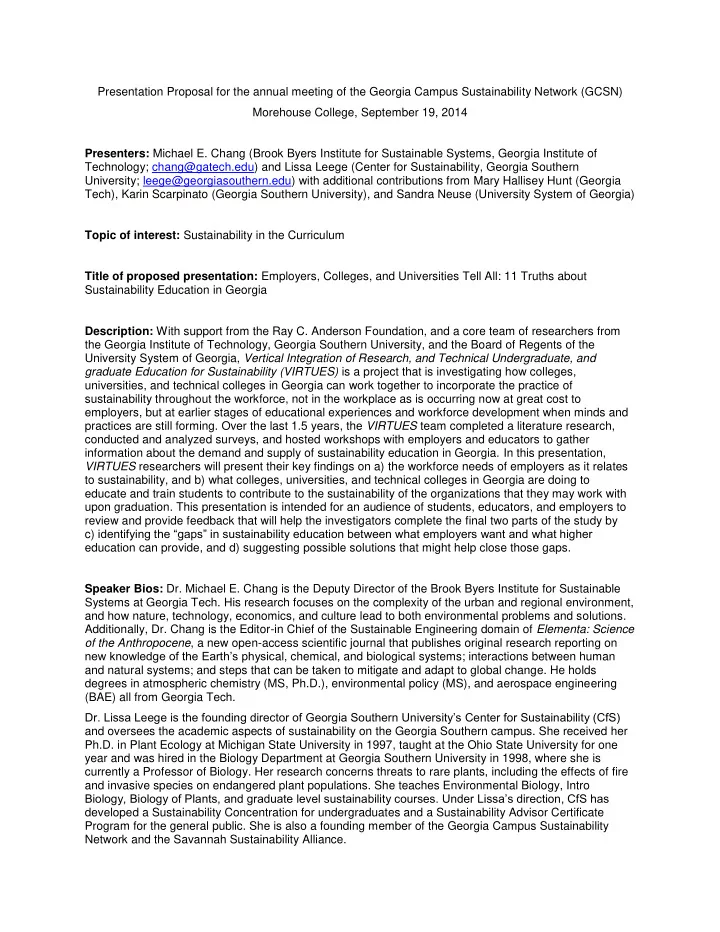

Presentation Proposal for the annual meeting of the Georgia Campus Sustainability Network (GCSN) Morehouse College, September 19, 2014 Presenters: Michael E. Chang (Brook Byers Institute for Sustainable Systems, Georgia Institute of Technology; chang@gatech.edu) and Lissa Leege (Center for Sustainability, Georgia Southern University; leege@georgiasouthern.edu) with additional contributions from Mary Hallisey Hunt (Georgia Tech), Karin Scarpinato (Georgia Southern University), and Sandra Neuse (University System of Georgia) Topic of interest: Sustainability in the Curriculum Title of proposed presentation: Employers, Colleges, and Universities Tell All: 11 Truths about Sustainability Education in Georgia Description: With support from the Ray C. Anderson Foundation, and a core team of researchers from the Georgia Institute of Technology, Georgia Southern University, and the Board of Regents of the University System of Georgia, Vertical Integration of Research, and Technical Undergraduate, and graduate Education for Sustainability (VIRTUES) is a project that is investigating how colleges, universities, and technical colleges in Georgia can work together to incorporate the practice of sustainability throughout the workforce, not in the workplace as is occurring now at great cost to employers, but at earlier stages of educational experiences and workforce development when minds and practices are still forming. Over the last 1.5 years, the VIRTUES team completed a literature research, conducted and analyzed surveys, and hosted workshops with employers and educators to gather information about the demand and supply of sustainability education in Georgia. In this presentation, VIRTUES researchers will present their key findings on a) the workforce needs of employers as it relates to sustainability, and b) what colleges, universities, and technical colleges in Georgia are doing to educate and train students to contribute to the sustainability of the organizations that they may work with upon graduation. This presentation is intended for an audience of students, educators, and employers to review and provide feedback that will help the investigators complete the final two parts of the study by c) identifying the “gaps” in sustainability education between what employers want and what higher education can provide, and d) suggesting possible solutions that might help close those gaps. Speaker Bios: Dr. Michael E. Chang is the Deputy Director of the Brook Byers Institute for Sustainable Systems at Georgia Tech. His research focuses on the complexity of the urban and regional environment, and how nature, technology, economics, and culture lead to both environmental problems and solutions. Additionally, Dr. Chang is the Editor-in Chief of the Sustainable Engineering domain of Elementa: Science of the Anthropocene , a new open-access scientific journal that publishes original research reporting on new knowledge of the Earth’s physic al, chemical, and biological systems; interactions between human and natural systems; and steps that can be taken to mitigate and adapt to global change. He holds degrees in atmospheric chemistry (MS, Ph.D.), environmental policy (MS), and aerospace engineering (BAE) all from Georgia Tech. Dr. Lissa Leege is the founding director of Georgia Southern University’s Center for Sustainability (CfS) and oversees the academic aspects of sustainability on the Georgia Southern campus. She received her Ph.D. in Plant Ecology at Michigan State University in 1997, taught at the Ohio State University for one year and was hired in the Biology Department at Georgia Southern University in 1998, where she is currently a Professor of Biology. Her research concerns threats to rare plants, including the effects of fire and invasive species on endangered plant populations. She teaches Environmental Biology, Intro Biology, Biology of Plants, and graduate level sustainability courses. Under Lissa’s direction, CfS has developed a Sustainability Concentration for undergraduates and a Sustainability Advisor Certificate Program for the general public. She is also a founding member of the Georgia Campus Sustainability Network and the Savannah Sustainability Alliance.
Eagles and Yellow Jackets secretly working together NEWS of Georgia Employers, Colleges, and Universities Tell All! 11 Truths about Sustainability Education in Georgia Elvis teaching history at GCSU
V ertical I ntegration of R esearch and T echnical, U ndergraduate and graduate E ducation for S ustainability
Organization X Workforce All the knowledge and skills in the world. University A Sustainability Knowledge & Skills University C College B
What employers have told us about sustainability and workforce initiatives as they relate to sustainability education: RE: opportunity • Employers greatly value experiences and education activities that occur in “real world” settings RE: curriculum • Competency in a host of soft skills including the ability to manage multiple priorities, possessing creativity in solving complex problems, and demonstrating the ability to think critically, plan strategically, and act logically • The business case for sustainability is of paramount importance RE: goals and objectives • Workplace sustainability initiatives were largely started and led by management
What educators have told us about sustainability higher education in Georgia: RE: opportunity • Undergraduate individual courses offer the most opportunity to engage large numbers of students • Graduate education may be the most difficult segment for sustainability to gain traction • Extra-curricular and co-curricular activities present tremendous opportunities for introducing students to and engaging them in sustainability • Funding for sustainability in campus capital projects and operations has not carried over to the education side RE: curriculum • There is wide variation in sustainability education • Assessment is limited or non-existent RE: goals and objectives • There is no common core of knowledge or skills for which all students are expected to obtain, and by extrapolation, can find common ground over later in their careers
Questions, questions, and more questions: Essential Components (what’s missing when they graduate?) • Can we agree on a common core? Vertical Integration • Across schools? • Across years? • Across disciplines? Delivery • One size fits all or different approaches for different schools? • Co-curricular/ extra curricular or required course? • What stage of education? • Intensive workshop or over a semester? Other?
V I Michael Chang (chang@gatech.edu) Mary Hallisey Hunt (mary.hunt@energy.gatech.edu) R T Lissa Leege (leege@georgiasouthern.edu) U E S Sandra Neuse (Sandra.Neuse@usg.edu)
Recommend
More recommend